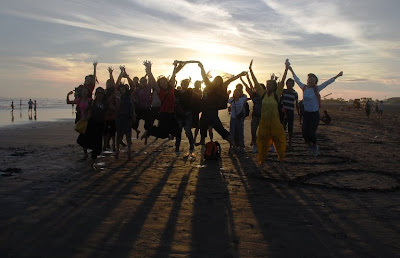By: Dr Yeoh Seng Guan
17 July 2009
This year’s study trip faced a quick succession of issues that threatened to extinguish its annual coming-of-being. The most serious were the global outbreak of the A (H1N1) virus (in early May) and the Indonesian presidential elections (in early July). Both invoked the unsettling specter of chaos and danger, and questioned the wisdom of persevering with the trip. Early on, another worry was the slow uptake of places which I suspect would have been quite different if touristic Bali was the advertised destination instead.
At the end of it all, I believe the remarkably colorful and graceful city of Yogyakarta fulfilled the promise of providing a portal into the multi-textured complexity of Javanese culture and society as evident in the many stories, videos and photos featured in this blog. If this particular trip has awakened and/or sustained an appreciation of how communities create an array of meanings and relationships in order to live meaningfully for this cohort of travelers, the key motif of these trips has been kept intact.
As in previous years, a venture of this nature would not be possible without the goodwill and help of a number of key people. Firstly, my appreciation goes to Dr Aris Arif Mundayat, the Director of Pusat Studi Sosial Asia Tenggara, Universitas Gadjah Mada, for readily agreeing to be the host institution and for providing various leads. Grateful thanks are also due to the many individuals, civil society groups, and kampong (village) residents for their generous sharing of knowledge and experiences. Without the graceful and tireless assistance of our student guides from Universitas Gadjah Mada in so many areas – Nana, Ike, Adi, Ambar and Arum - this trip would have been clueless. Lastly, a special word of gratitude goes to Nurina Malinda and her sister Diah Martengsari for all the months of background logistical support. Nurina is a veteran traveler of the study trips to the Philippines (2007) and Cambodia (2008), and her enthusiasm for this particular trip to her home city was infectious.
This is the fifth year in which the “In Search of” study trips have unfolded in the diverse human settlements of Southeast Asia – Penang (Malaysia), Bangkok (Thailand), Baguio & Sagada (Philippines), and Siem Reap (Cambodia). In comparative terms, this year’s cohort of enthusiastic and capable student travelers hailing from different countries is the most extensive – Australia, China, India, Indonesia, Malaysia and Singapore. Admittedly, at times this proved to be a formidable multicultural challenge requiring patience and forbearance for all concerned. But I am also happy to report that they rose up well to the occasion. The sight of young men and women from different cultural backgrounds striving together to successfully tackle a common task placed at their feet despite all the odds gives one cause for hopeful optimism. For the first time, this year also saw the participation of two alumni and former travelers, Aron and Eunice, and their presence enlivened the motto of Monash University, ancora imparo – “I am still learning”.

WRITER'S PROFILE: Dr Yeoh Seng Guan has been scheming study trips for students of Monash University’s School of Arts and Social Sciences since 2004. In his free time, he continues to research, film, and write on urban subalterns in Southeast Asia.























